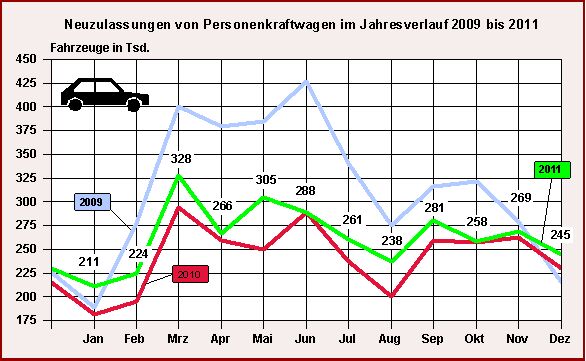2011 Car Sales Around The World: Germany Up 8.8 Percent

Germans bought 244,501 cars in December, which brought German sales for the year 2011 to 3.17 million units, up 8.8 percent compared to 2010. According to data released by the German Kraftfahrtbundesamt, the German love affair with oil burners continues unabated: 47.1 percent of all newly registered cars run on diesel. In all of 2011, Germans bought 2,154 EVs and 12,622 hybrids.
Nearly two thirds of cars registered 2011 (64.7 percent) are German brands. The government agency (and everybody else in Germany) counts Opel and Ford as a German brand. Porsche (+15.0 percent) and Ford (+16.5 percent) had the strongest growth amongst domestic brands. With a growth of 11.9 percent, Volkswagen further solidified its overpowering lead. Amongst the import brands, Hyundai gained market share with +16.9 percent. Volvo (+31.4 percent) and Lancia (+60.2 percent) were the biggest gainers amongst the import brands. Detailed data can be downloaded here.

Bertel Schmitt comes back to journalism after taking a 35 year break in advertising and marketing. He ran and owned advertising agencies in Duesseldorf, Germany, and New York City. Volkswagen A.G. was Bertel's most important corporate account. Schmitt's advertising and marketing career touched many corners of the industry with a special focus on automotive products and services. Since 2004, he lives in Japan and China with his wife <a href="http://www.tomokoandbertel.com"> Tomoko </a>. Bertel Schmitt is a founding board member of the <a href="http://www.offshoresuperseries.com"> Offshore Super Series </a>, an American offshore powerboat racing organization. He is co-owner of the racing team Typhoon.
More by Bertel Schmitt


































Comments
Join the conversation
I am glad you are now saying "German" cars are around two thirds of the market, much less than Japanese cars are in the Japanese market. This goes back to an article about a month ago about how open the Japanese market is. I would still love to know how Ford is classified as German. The German subsidiary is fully owned by Ford (headquartered in the USA) and has a English name. It is like saying Lotus is British when it is fully owned by a Malaysian company (Proton), or LJR is British when owned by the Indians. The heritage is there as British (just like I accept Opel's heritage is German) but they are no longer British companies. As for Ford it may be designed/engineered and built in Germany and other European companies but that is no different from EU specific Toyota cars (Avensis, Auria etc) and everyone classes Toyota as a Japanese company.
What is considered a 'domestic' and what is considered an 'import' is a hotly debated topic up here in the hinterland. The young 'uns (under 30) would have little or no recollection of the time when the Big Three were, indeed, the Big Three. I'm just old enough to remember a guy in my grade 12 class getting a Datsun 210SX and the rest of us going, 'gee, that's kinda weird.' I happen to have the misfortune of living in a market where Detroit has been reduced to less than 20% of the market COLLECTIVELY and has remained there for several years now. Ugh. In North America, Japan Inc has done an outstanding job of muddying the waters. The blogosphere is just chock full of what is more 'American:' an Accord made in Ohio, or an Impala made in Ontario. Brilliant strategy on the part of Japan Inc! Kudos. However, like Ford and GM in Germany, I take the view that with the D3 having been in Canada, both manufacturing and (to an extent, especially GM) designing their vehicles here, for 80+ years, they would be grandfathered, due to exceptional inter-breeding. In fact, since GM bought/merged with McLaughlin Motors, Canadian since the mid-1860s - how can you get more 'domestic' than that? Honda brags about their 25th anniversary in Alliston, Ontario. Toyota hires 900 workers in Woodstock, Ontario as Ford lays off 2,400 up the highway in Oakville - this is the conundrum that Japan Inc presents to Canadians. Sure, only Japan Inc bothers to assemble vehicles here: Germany exports every vehicle it sells in Canada. However, since Detroit is given free reign in Germany, by extension so should Germany in North America. That's fair, I suppose. (Although I am under no misapprehension that Japan Inc deigned to build a couple factories here out of the goodness of their hearts: not even taking into account the huge incentives Ontario lavished upon them, it's a backdoor into the much more significant American market while hiding under Canada's skirt. If a 'buy America' revolution swept the nation, could Canada survive? My fellow Canadians conveniently ignore that tiny detail.) I'm glad Germans take a mature attitude toward Opel and Ford. It is, afterall the backbone of free trade, no? Germany sells a lot of cars in North America, as does Detroit in Germany. Japan? Well, if Japan Inc practiced anything resembling free trade, I'd be all for it. The fact that Japan Inc is successful really in only 2 markets in the world (North America and Japan) will be an interesting subject for future generations to consider, probably in Chinese or Arabic, as they sift through the ruins of Western civilization one day.